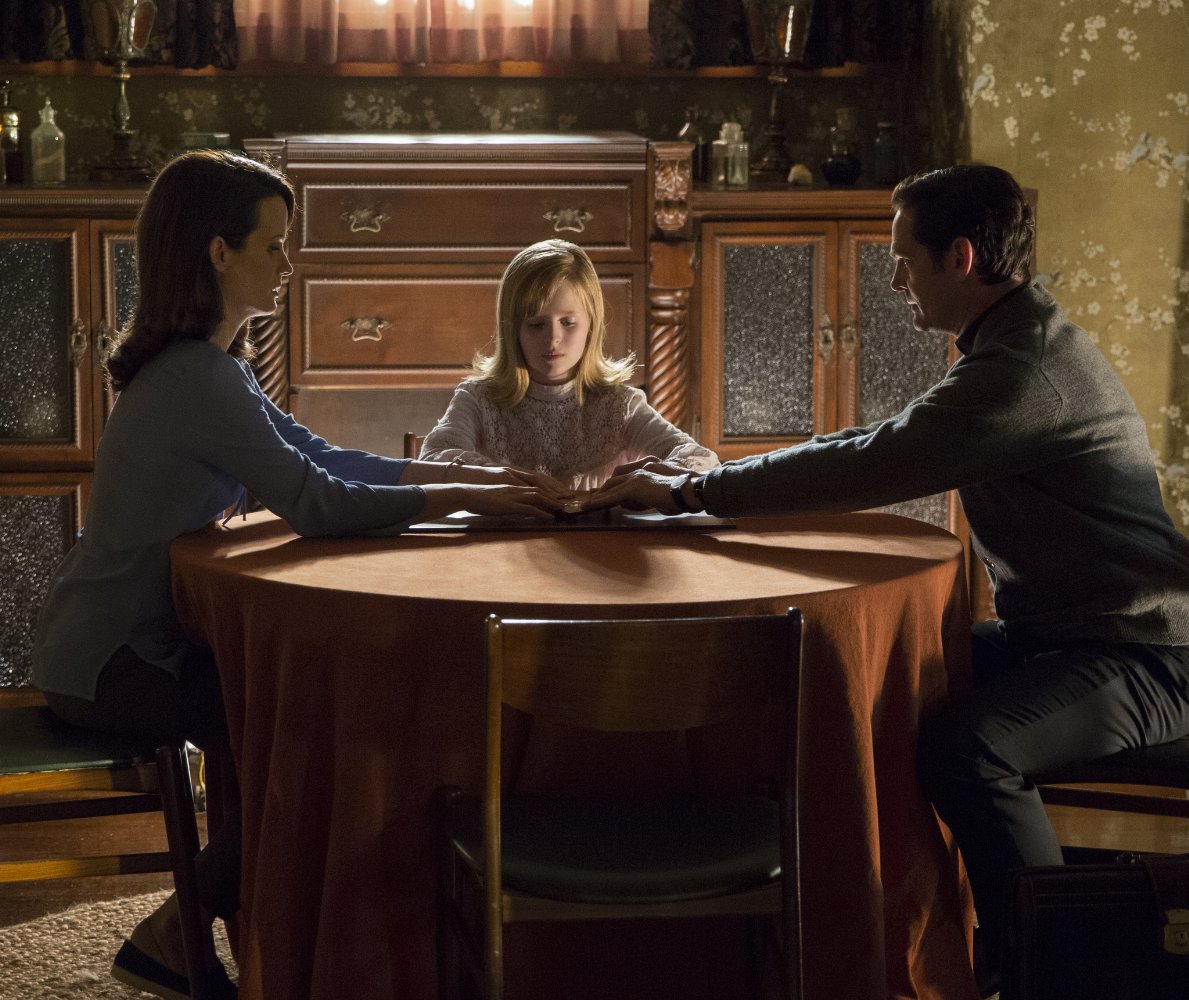Every year for me as a moviegoer, one genre usually stands out amongst the rest as their year. 2016 for me is the year of great horror movies. Think about it: Don’t Breathe, Conjuring 2, Lights Out, The Invitation, Blake Lively fighting a shark. Heck, even The Purge: Trump Edition was super fun this year!! Not gonna lie, I laughed at the Ouija prequel when I saw the trailer; however, it can proudly stand along the horror spookaissance of 2016.
Ouija’s origins start in LA in 1965. Alice Zander (Elizabeth Reaser) is a young widow trying to make ends meet as a faux medium. She involves her oldest Lina (Annalise Basso) and youngest Doris (Lulu Wilson) in the act as well, as the family is pretty close with the loss of their father/husband. Looking to spice up the gimmick, Alice brings home a Ouija board on the suggestion of Lina. However, it is Doris who takes a shine to the board, for reasons no one can really explain. Unfortunately, the effect of the board starts messing with Doris, much to the concern of the family and Father Tom (Henry Thomas), their mentor at Catholic school.
Ouija: Origin of Evil’s best move is behind the scenes. Mike Flanagan is as great of a horror ringer (with the exception of James Wan) to bring into a franchise movie. Flanagan, I can’t say this enough, got me to believe that a mirror could kill people, so giving him a surefire scary premise is easy like Sunday morning for Flanagan. So instead of worrying about the scare beats (which are scary enough), Flanagan focuses on period details and character development. The 1965 timeframe gives the religious influence and innocence much more punch than they would in present day. Flanagan realizes that when we see a Ouija board, we see it as a way to connect with someone lost. As such, building the story around a family trying help themselves and others connect with lost loved ones gives the audience sure footing in Ouija’s world of the supernatural. Each of the four have some reason to use Ouija or try to, and all to try to ease pain on someone else in the family. Even the reasons for resistance to the game aren’t seen as dumb by the users, and in fact help show surprising agency, particularly for Father Tom. Characters we want to root for make the third act suspenseful enough that Flanagan can be less reliant on manipulative scare tactics and trust the audience’s desire to connect with his broken family.
Flanagan also has a knack for casting smartly. He brings back Annalise Basso from Oculus to play Lina; Basso’s character has agency enough not to complain until she makes a plan for herself, but to solicit smart people to help her out, while still dealing with her own grief from her past: a believeable teenager basically. Elizabeth Reaser and Henry Thomas are also great as the damaged adults. Thomas gets to be a priest with a tricky mix of empathy and agency, and Reaser gets more emotional beats as she has to reveal more of her struggles from the board. Lulu Wilson is the obvious star though, as a ‘creepy kid’ movie doesn’t work without a creepy kid. Flanagan does a great job directing Wilson to be unbelievably innocent and shy to start the film, and then slowly removes her empathy as the story goes on. This iciness helps create terrifying dread as the movie propels forward, with some great laughs here and there to cut audience tension. Word for anyone: when a little girl who intimately describes strangling to you wants you to see something “cool” in the basement, just say no.
Ouija: Origin of Evil could have relied on the built in franchise appeal and just gone through the motions. Instead, great writing, directing, and acting talent was put into the production, to elevate a by the numbers story into something really solid. However, I’m unsure why Ouija’s salesman would agree to these films? I’m now horrified that if I buy a Ouija board, I surely will summon spirits. Not smart.

